
Men worry about losing their hair, and rightly so: male pattern hair loss affects more than 50 percent of men by the age of fifty worldwide. The results of studies released in Seville, Spain earlier this year should put balding men at ease.
How hair grows
It is important to understand how hair growth and hair loss work. Each scalp hair grows for four to seven years, then rests, and finally falls out. For every hair that falls out, a new hair will grow from the same follicle, normally within three months.
As people age, the rate of growth slows. Hair loss occurs when there is a progressive shrinkage of the hair follicle, resulting in shorter and finer hair. The end result is a miniature follicle . . . with no hair.
Read: Triggers for hair loss
Research found that men with androgenetic alopecia, or male pattern hair loss, have increased levels of dihydrotestosterone (DHT) in the balding scalp. It led to the development of a breakthrough prescription medication for the treatment of balding in men.
The treatment inhibits the formation of DHT. It has been shown to stop hair loss in about 90 percent of men. Re-growth of hair was observed in 65 percent of men treated with this medication, while all men on placebo experienced a decrease in hair counts.
Living proof of this good news was provided at a media workshop in Seville, Spain earlier this year, when results of a Twins Hair-Loss Study, published in The European Journal of Dermatology, were made public. Nine pairs of identical twin brothers, or 18 men, participated in the study.
Read: Balding: True or false?
"Because twins are mirror images, the study participants could compare where they were - one year after taking the prescription medication to address their hair loss - to where they would be if they had done nothing," says Dr Dow Stough, executive director of the Stough Dermatology Clinic in Hot Springs, Arkansas, US.
All the men with male pattern hair loss who took the prescription medication for one year had no further visible hair loss and many even grew new hair. More than half of their identical twin brothers, who took placebo during the same time period, continued to visibly lose hair, according to the Twins Hair-Loss Study results.
Read: New target in the fight to baldness
"Identical twins share identical genes and offer a unique, highly efficient control for studies into genetically determined conditions such as male pattern hair loss," says Stough.
"By the seventh month of the study, I knew my hair was getting thicker than my brother's hair," said Josh Hurst, a 26-year-old law student and study participant, who only learned at the study's conclusion that he had received the treatment. "I was happy and relieved when I realized that it was working, and that I could take control of my hair loss. I just didn't want to lose any more hair."
Where to get help
"This study is unlike other clinical trials, because we not only have data affirming the safety profile and efficacy of this treatment, but we have actual living proof that it works," says Senior Medical Director Dr Naveen Rao. "We can see the difference in the twin brothers' appearance in real-time.
Read more:




 Publications
Publications
 Partners
Partners















